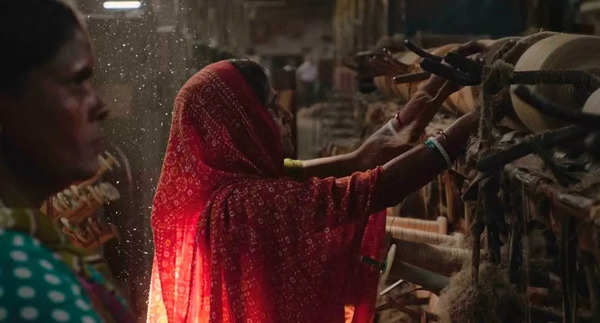KOLKATA: The once-flourishing jute industry in Bengal, with an illustrious history spanning over 165 years, has experienced a precipitous decline in recent times. Notwithstanding the shutting down of more than 35 jute mills in the last five years and countless others in various stages of dilapidation along the banks of the Hooghly, there has been a glaring dearth of documentaries encapsulating the quintessence of this industry.This lacuna was ultimately bridged by Nishtha Jain’s ‘The Golden Thread (TGT)’ which recently won the top award for Best Documentary Film in the International Competition at Mumbai International Film Festival (MIFF) that carries a cash prize of Rs 10 lakh.
The Golden Conch award for TGT, Jain’s third film on the working class following ‘Lakshmi and Me’ and ‘At My Doorstep’, is opening new doors with people wanting to watch it. “Of course, awards help to bring attention to your film as do selections in A-list festivals abroad. The problem with this is that it’s the award or the festival label that gives the film its worthiness and not its inherent merit, promoting a certain elitism amongst films, film-makers and festivals,” she said.

Nishtha Jain
A 2014 Bengal screening of ‘Gulaab Gang’ introduced Jain to a case where workers brutally murdered a jute mill CEO in Bhadreswar. Intrigued, Jain sought permission to visit a factory, which set the project in motion.
Subsequently, during a visit to Scotland, she explored Dundee, once known as Juteopolis for its strong ties to the jute trade.
While the oral or visual history of Bengal has scarcely acknowledged this industry, the sole representation of numerous abandoned jute mills in contemporary cinema and OTT series is as a backdrop for action sequences. “When these places close down, there is nothing for the workers. Then they are utilized for film sequences or sold off as real estate,” Jain said. Her documentary couldn’t afford the exorbitant Rs 1 lakh daily fee to capture the raw and gritty essence of filming such sequences there.
Rakesh Haridas’ cinematography is a far cry from the grit and grunge associated with jute mills. Each frame is beautifully captured. “There is a lot of light that filters inside the factories. That illuminates the jute threads and they look like gold,” Jain explained.

A still from ‘The Golden Thread’
This documentary is stylistically quite different from Jain’s other works. Rather than being a mere repository of facts or a montage of interviews, TGT makes a departure from the expectations that people have about a documentary on this industry. Jain’s refusal to magnify union leaders and their dialogues is a statement by itself. “If there was an active movement, would this be the condition of the workers?” she asked.
So, her documentary adopts a compassionate approach, highlighting the unsung workers’ modest dreams and aspirations without ever becoming verbose. Niraj Gera’s sound design strategically replaces the deafening cacophony inside a factory with silence or the sound of a cycle – a symbol of early nation-building. “This docu is my video letter to Lata Bajoria who is the chairperson of Hukumchand Mills and a jute lover. Jute workers have forever been demonized. But they are beautiful people who come with dreams but there are no work possibilities. So they end up working in an industry that they no longer take pride in,” she added. Jain is hoping that in the backdrop of plastic ban, her film’s lens will make Bengal feel proud of the long history of its eco-friendly industry.
We also published the following articles recently
Discover how Dhanush’s ‘Captain Miller’ clinched the Best Foreign Language Film award at the UK National Film Awards. Learn more about the pre-Independence period drama that has garnered praise and fan celebrations. Find out about the talented cast and director behind the acclaimed movie.






